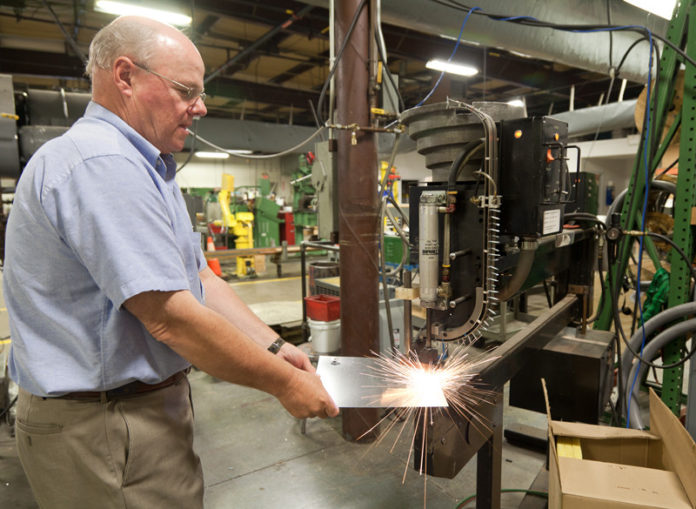
Are American jobs that were once shipped overseas now returning to Rhode Island? For Raymond W. Fogarty, director of the Chafee Center for International Business at Bryant University, the answer is an unequivocal “yes.” Furthermore, he insists that the trend isn’t luck but skill, as local companies are now able to better compete with their foreign counterparts with improved, cheaper products.
“They are not winning their contracts by waving a flag and saying, ‘Buy in the USA,’ they are winning based on the price, competitiveness and quality control of our products,” Fogarty said. American costs have flattened while its productivity continues to skyrocket; there is a brighter future for job growth in manufacturing, Fogarty said.
“Many of the companies we work with have something to do with manufacturing,” said Fogarty of the center, which provides international business assistance for those in the state looking for market research or training programs. “Furthermore, the National Association of Manufacturers came out with a study that said for every one manufacturing job, 3.4 services jobs are created.”
He is confident that if 10,000 manufacturing jobs are created locally, an additional 34,000 in supporting services will follow. Together, the 44,000 jobs would take a large bite out of the state’s unemployed – as of May 2012, the number of unemployed Rhode Island residents was 61,400, according to the DLT.
Laura Hart, communications manager for the R.I. Department of Labor and Training, agrees with Fogarty that manufacturing is returning. “You can definitely see it,” said Hart, who sees grant applications from small businesses on a regular basis.
Manufacturing played a large role at this year’s 27th annual World Trade Day at Bryant University on May 23. This year’s theme, “Made in the USA” focused on a resurgence in local manufacturing and a return of such jobs from overseas. For much of the 2000s manufacturing left the state; now, that trend is reversing.
As part of trade day, approximately 12 companies were profiled, complete with interviews and video, in a thorough examination to see what is working overseas and what efforts are failing, and why. “Many of these companies are globally competitive today even though they were having a difficult time two years ago,” he said. “It’s become more promising with each year.”
“Our manufacturing in the U.S. could be on an upsurge,” Fogarty continued. “People are starting to bring back their manufacturing from around the world because, from a cost-competitor perspective, by 2015, [United States] manufacturing costs will be competitive.”
Fogarty gives credit to the country’s output, which is still very high because of innovation and productivity. He admits that the U.S. is still losing certain industries to low-cost manufacturing companies overseas, but also sees a growing trend in American companies making more conservative choices when considering oversea options. He has also seen several cases of local companies bringing manufacturing to the U.S.
“We take a look at who is new and who is reinventing themselves. Biomedical Structures [of Warwick] is growing. They make the internal composite textiles for the medical industry. They are another example of making it here and selling it elsewhere,” he said.
He questions how financial difficulties will play out in Europe or how consumer spending will play a role, but he believes American companies are poised to be globally competitive for the next few years.
Another local example is Cranston-based Alex and Ani, which is doing quite a lot of business with Spain right now. “Everyone mentions them because of their growth, which is in manufacturing jewelry from Sudan. They are doing this using Rhode Island workers, and now those products are going all over the world. They are competitive in a local market. They are hiring more Rhode Islanders and are training them to stay.”
In East Providence, Gripnail Corp. President David Ashton is learning more and more on how to break into new overseas markets. “We’ve seen an increase with heavy industrial equipment right across the board,” he said. The maker of industrial fasteners has seen his products used increasingly in countries that include Mexico, Brazil, Australia, South Africa and China.
“They have really done a great job in taking Rhode Island businesses overseas,” Fogarty said.
Ashton recognizes that his production practices have improved with the help of investing in some hi-tech machinery and tooling. Now Gripnail can compete on the world stage. “Our products are popular in Europe and South Korea [but] we’re selling all over the world,” he said.
Fogarty also touts the advances made by Lincoln-based Chem-Art.
“They’ve come back because they have reinvented themselves; they do things differently,” said. Like Alex and Ani, Chem-Art has its roots in the jewelry industry; nowadays, both are doing more international projects than in the past.
“Workers had to chip in and understand they couldn’t keep receiving more benefits and salaries until we became competitive again,” Fogarty said. “The ones that did, that made the hard decisions, rewarded some of their employees by bringing back some of their hours.”
With 275,000 sq. ft. of manufacturing space available, Hope Global, of Pawtucket, is a textile company doing very innovative weaving for the auto industry. It’s because of their innovation that they are working seven days per week, three shifts per day, Fogarty said.
The Cooley Group, of Pawtucket, has already announced its manufacturing capacity will be increasing. The company fabricates plastic, woven textiles and high-performance membranes for billboards, the automotive industry and the U.S. Department of Defense. Some designs will be used in the main Olympic stadium in London this summer.
“That’s another Rhode Island company that’s building its workforce once again,” Fogarty said. •












